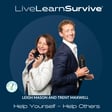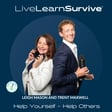
Interview with Allan Sparkes CV,OAM,VA,FRSN, awarded The Cross of Valour in 1998 for the brave rescue of a young boy.
Allan is one of Australia’s most highly decorated citizens, being one of only five Australians in the past 49 years to receive Australia’s highest bravery decoration, The Cross of Valour, awarded in 1998 for saving the life of a small boy trapped in a flooded storm water pipe in Coffs Harbour. In 2016, for another lifesaving rescue, Allan was awarded Australia’s fourth highest bravery decoration, the Commendation for Brave Conduct for his rescue of an aboriginal man from the path of an incoming train at Redfern railway Station. In 2017 Allan was awarded the Medal of the Order of Australia (OAM) for service to Mental Health Support organisations and the community. He is the recipient of the NSW Police Commissioners Valour Award (VA) and the Royal Humane Society of NSW Galleghan Award. He is one of only 10 Australians to receive the Queen’s Diamond Jubilee Medal, the Queen’s Platinum Jubilee Medal and the Kings Coronation Medal. In September 2022, Allan was invited by St James Palace to attend the funeral of Her Majesty Queen Elizabeth II where he took part in the Chivalry and Gallantry Procession during the funeral proceedings. Allan is a 20 year veteran of the NSW Police force, and of recent times, a Deputy Commissioner of the Mental Health Commission of NSW.
"Trigger Warning: This episode contains discussions of mental health issues, including topics related to suicide, which may be distressing for some listeners. Please take care while listening, and remember support is available if you need it.
If you or someone you know is struggling, consider reaching out to one of these resources:
- Lifeline – 13 11 14 (24/7 crisis support and suicide prevention)
- Beyond Blue – 1300 22 4636 (support for mental health issues, available 24/7)
- Suicide Call Back Service – 1300 659 467 (24/7 support for people at risk of suicide and those affected by it)
- Kids Helpline – 1800 55 1800 (free counselling for ages 5–25, available 24/7)
- MensLine Australia – 1300 78 99 78 (24/7 support for men dealing with family and relationship issues)
For young people, Headspace offers online and in-person mental health support at headspace.org.au.

